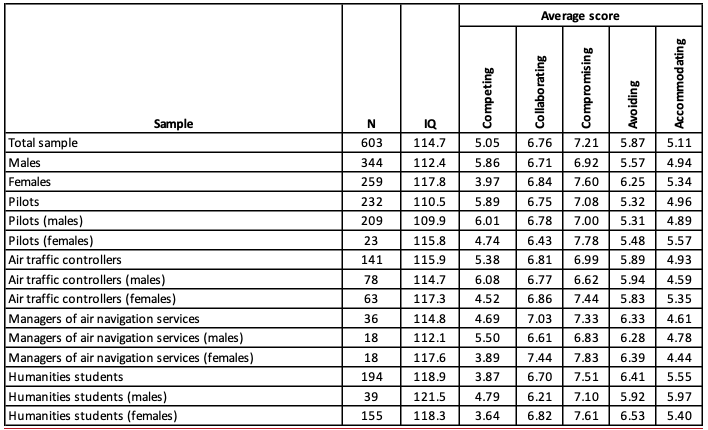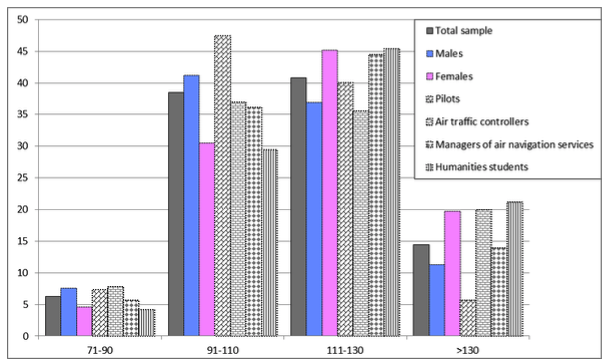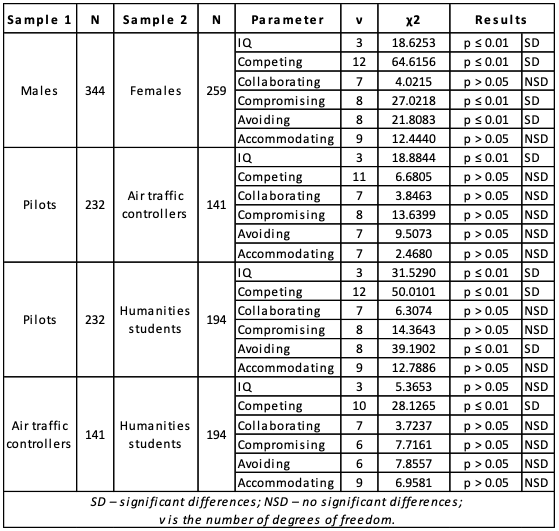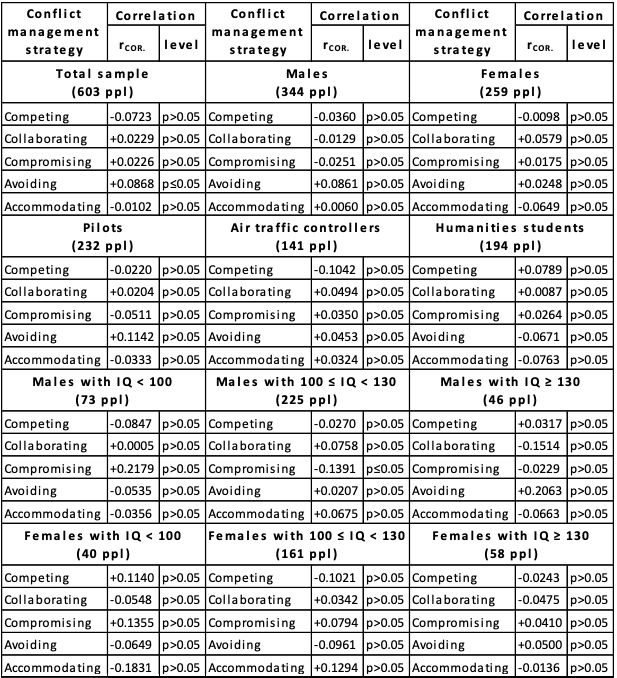

 Vol. 40 (Number 44) Year 2019. Page 29
Vol. 40 (Number 44) Year 2019. Page 29
ARINICHEVA, Olga V. 1; LEBEDEVA, Natalia A. 2 & MALISHEVSKII, Aleksei V.
Received: 16/07/2019 • Approved: 18/12/2019 • Published 28/12/19
ABSTRACT: The article presents the results of a study whose purpose was to identify the relationship between preferences among various categories of aviation students for certain conflict management strategies (the Thomas-Kilmann Conflict Mode Instrument, adapted by N.V. Grishina) and the level of their intellectual functioning (Eysenck’s IQ test). A total of 603 people was surveyed (science and humanities students). Data analysis was conducted. Despite the fact that the sample used in the study was of a fairly large size and covered representatives of different occupations (both men and women), no correlations between IQ scores and conflict management strategies in any of the groups were found. |
RESUMEN: El artículo presenta los resultados de un estudio cuyo propósito fue identificar la relación entre las preferencias al elegir la estrategia de manejo de conflictos (el Instrumento de Modo de Conflicto Thomas-Kilmann (TKI) en la adaptación propuesta por N.V. Grishina) y el nivel de desarrollo intelectual (la prueba de CI de Eysenck) entre varias categorías de estudiantes. Se examinó a un total de 603 personas (estudiantes de especialidades técnicas y de humanidades). Se analizaron los datos obtenidos. A pesar de que la muestra utilizada en el estudio era de un tamaño bastante grande y abarcaba representantes de diferentes ocupaciones (tanto hombres como mujeres), no se encontraron correlaciones entre los puntajes de CI y las estrategias de manejo de conflictos en ninguno de los grupos. |
The negative impact of the human factor is one of the main causes of accidents in the aviation industry. Previous works by the authors of this article, in particular Malishevskii, Arinicheva & Vlasov (2016) and Smurov et al. (2017), consider possible ways of reducing the negative impact of the human factor on flight safety. One of these ways is to establish more effective communications between the crew members on an aircraft. It is necessary to work towards this goal because, according to the results of the studies conducted over many years by the Interstate Aviation Committee, which is an executive body of the Civil Aviation and Airspace Use Council of the Commonwealth of Independent States (CIS) and was established in December 1991 on the basis of the Civil Aviation and Airspace Use Multilateral Agreement signed by 12 newly independent states in order to harmonize the development of civil aviation, about 7% of all the accidents which resulted from the human factor happened because of flawed interaction between crew members. This issue was studied by several researchers, including the authors of this article (Smurov et al., 2017; Pyatko et al., 2017; Arinicheva et al., 2018b; Arinicheva et al., 2008).
One of the most important factors affecting interaction´s efficiency is the conflict management strategy chosen by crew members. The question of whether there is a connection between preferences for using a particular conflict-handling mode (competing, collaborating, compromising, avoiding, and accommodating) (Kilmann & Thomas, 1977; Kardashina & Shangina, 2016) and other psychological traits of aircraft crew, such as the level of their intellectual functioning, laid the foundation for the studies reflected in this article. The authors have already addressed this issue in their previous work (Arinicheva & Malishevskii, 2017) by using a relatively small sample group.
There are different opinions regarding this issue. For example, there is an opinion that there is a positive relationship between the intelligence quotient and the competing mode and a negative relationship between the intelligence quotient and the avoiding mode (Prudnikova, 2016).
On the other hand, Grinina (2014) notes that "the data resulting from the study indicate that mentally challenged participants give preference to the strategy of competition. The average score of this group for this strategy was 7.5 points. Despite the fact that this result describes the average manifestation of the strategy in conflicts among the participants, the indicators on the scale of competition for mentally challenged high school students significantly exceed those in the groups of participants without any mental issues" (p. 61).
Aggression is often the cause of destructive behavior in conflicts. Researchers Kuular and Buduk-ool (2017) note that "people who choose an ineffective conflict management strategy manifest higher levels of aggression, which may be caused by the fact that conflicts and disputes let them satisfy their interests in conflict situations" (p. 75). This is why a paper by L. Huesmann, L. Eron and P. Yarmel (1987) becomes of great interest. In this paper, the authors present the results of a 22-year-long study in which they collected data on aggression and intellectual functioning in more than 600 subjects, their parents, and their children, and came to a conclusion that both aggression and intellectual functioning have similar models of stability and remained the same over three generations (pp. 234-235).
Some interesting observations are also presented by J. Kruger and D. Dunning (1999), who used fairly large samples, showed that both low and high degrees of competence and talent result in distorted self-esteem. It becomes inflated in the first case and deflated in the second one due to the "false consensus effect" (Ross, Greene & House, 1977). In fact, both deviation types can lead to an ineffective conflict management strategy. It will provoke competition in the first case and avoidance as well as accommodation in the second one.
Extensive statistics presented in a number of works (Litvintseva, 2016; Meng et al., 2018; Fateyeva & Kulikova, 2015; Parmer, 2018; Gunkel, Schlaegel & Taras, 2016; Caputo, Ayoko & Amoo, 2018; Debas & Narayana, 2016; Buduk-ool & Kuular, 2017; Dijkstra et al., 2016; Kozevnikova, Skoromnaya & Javorskaya, 2012; Başoğul & Özgür, 2016; Ishkov & Miloradova, 2017) show that there is a fairly wide range of conflict management strategies in different age, gender, and occupation groups, but, unfortunately, these strategies are discussed without reference to the intellectual functioning of the representatives of these groups. Finding correlations between IQ and other psychological indicators seems to be a promising task, because IQ tests are highly reliable in comparison with personality inventory tests which have several disadvantages (Arinicheva & Malishevskii, 2016). This would make it possible to improve the psychological screening of future pilots and air traffic controllers. Issues connected with this procedure are addressed by several researchers (Malishevskii, Arinicheva & Vlasov, 2016; Arinicheva & Malishevskii, 2017; Arinicheva et al., 2018a).
It is for this reason that the goal of this study, which consisted of analyzing conflict management strategies among aviation and humanities students and searching for correlations between these strategies and intellectual functioning, is important and relevant.
603 students from St. Petersburg and Irkutsk took part in the study. The main focus was on students at St. Petersburg State University of Civil Aviation since the principal interest of the study was to improve the psychological screening of future pilots and air traffic controllers. However, in order to remedy the shortcomings described in our previous paper (Arinicheva & Malishevskii, 2017), humanities students at St. Petersburg State University of Civil Aviation and the Institute of Philology, Foreign Languages and Media Communications at Irkutsk State University were also included in the sample.
The following groups of students took part in the study:
● civil aviation pilots – 232 students (St. Petersburg State University of Civil Aviation);
● air traffic controllers – 141 students (St. Petersburg State University of Civil Aviation);
● managers of air navigation services – 36 students (St. Petersburg State University of Civil Aviation);
● human resources (HR) managers – 53 students (St. Petersburg State University of Civil Aviation);
● public relations (PR) managers – 19 students (St. Petersburg State University of Civil Aviation);
● foreign studies specialists and translation specialists – 122 students (Irkutsk State University).
Division by sex: ● male – 344 students, ● female – 259 students.
The age of participants ranged from 17 to 27 years.
The studies conducted at the premises of St. Petersburg State University of Civil Aviation and the Institute of Philology, Foreign Languages and Media Communications at Irkutsk State University were carried out in accordance with the fundamental principles of bioethics and on a voluntary basis.
In the study, we used a general test containing 40 items which was developed by H. J. Eysenck (Kasianov (comp.), 2000) in order to estimate the participants’ IQ, and a version of the TKI test (Kilmann & Thomas, 1977) adapted by N. V. Grishina (Kudryshov (ed.), 1992) containing 30 pairs of statements reflecting how five different conflict management strategies are expressed.
"Based on the idea that a person focuses either on their own interests or the interests of an opponent", K. Thomas (1977, cited by Kuular & Buduk-ool, 2017, p. 68) defines behavior strategies in his methodology as follows: ● competing is a person’s desire to pursue their own concerns at the other person’s expense; ● accommodating is the complete opposite of competing and means sacrificing one’s own interests for the sake of another person; ● compromising is the result of the first party’s strong interest in the success of the second party combined with a moderate interest in their own success; ● avoiding is characterized as a lack of desire for collaboration and a lack of desire to achieve personal goals; ● collaborating is a situation where the participants choose an option which fully satisfies the concerns of both parties".
A correlation analysis, which included calculating the Pearson correlation coefficient and conducting Pearson’s chi-squared test, was carried out using the R programming language (Data Science and Analytics (DSA), 2019), which is widely used as statistical software for data analysis and has virtually become a standard for statistical programs. It is available under the GNU GPL license (Free Software Foundation (FSF), 2019).
The preliminary usage of Eysenck’s general test (see table 1) made it possible to divide the participants into five standard categories (Eysenck & Evans, 1995) depending on their IQ scores (to be precise, into four categories as there were no participants with extremely low results (IQ < 70) in any of the samples, which was natural). As can be seen from table 2, the lowest average IQ (109.9) was shown by male pilots and the highest average IQ (121.5) was shown by male students studying humanities. This gap is quite big, as it usually did not exceed 4 to 6 (most often 4) points for students from different academic programs provided by St. Petersburg State University of Civil Aviation (Arinicheva et al., 2018b; Arinicheva & Malishevskii, 2017; Arinicheva & Malishevskii, 2016).
Table 1
Distribution of the Eysenck’s IQ test
results on different samples

-----
Table 2
Average values of IQ and conflict management
strategies on different samples

A comparison of the IQ distribution across the samples showed (see fig. 1 and table 3) that, according to Pearson’s chi-squared test, the differences between the samples were highly significant (p ≤ 0.01), excluding the differences (p > 0.05) between air traffic controllers and humanities students (which was not very clear).
Figure 1
Distribution of the Eysenck’s IQ test results on different samples (%)

The results of the TKI test showing preferences for particular conflict management strategies, presented in table 2, demonstrate that men are much more prone to competing than women, which is also true for future pilots in comparison with humanities students. At the same time (see table 3), according to Pearson’s chi-squared test, it is in terms of the proneness to competing that there are highly significant differences (p ≤ 0.01), excluding differences between air traffic controllers and pilots (p> 0.05), which is quite predictable. Significant differences (p ≤ 0.01) can also be seen between future pilots and humanities students in terms of resorting to avoidance as well as between men and women in terms of almost all conflict management strategies. The age of participants ranged from 17 to 27 years. No correlations associated with age were identified.
Table 3
Pearson’s chi-squared test results

One might think that the conclusions made by Prudnikova (2016) about a positive relationship between the IQ score and the competing mode and a negative relationship between the IQ score and the avoiding mode are correct, because the future pilots who participated in our study were both more inclined to competing and are less intelligent than the humanities students. However, it is quite obvious (table 4) that there are no significant correlations between IQ scores and any conflict management strategy in twelve different samples. Correlation levels are low, and there are only two significant correlations out of sixty (starting from differences in gender and occupation and ending with the division of the participants into groups according to different IQ scores taking gender into account).
That is, there are significant differences in intelligence and some conflict management strategies between samples (see table 2), but, nevertheless, neither the total sample of 603 students nor the divisions by sex or occupation (see table 4) show significant correlations between IQ scores and conflict management strategies.
Table 4
Correlations between the IQ scores and conflict
management strategies in different samples.

Taking into consideration that there are no pronounced differences in preferences for one or another conflict management strategy between different categories of the participants – this is also generally true for the data presented in the paper by I. I. Prudnikova (2016) – one should agree with E. S. Grinina (2014) that "competing, collaborating, compromising, avoiding and accommodating conflict-handling modes are moderately expressed in all the groups, which indicates the ability of the participants of a given age to be flexible in conflict situations and take into account the conditions in which parties in a conflict interact" (p. 65). This confirms the conclusions made earlier by the authors (Arinicheva & Malishevskii, 2017).
The IQ scores of the students who took part in the study are generally quite high. On average, they range from 110 points and above in all samples (109.9 for male pilots only). However, the fact that there were 21 students with IQ scores lower than 90 (one future pilot with a score of 78 and one female student studying HR management with an even lower score of 76) means that it would be beneficial to supplement the already existing psychological methods of screening future pilots with IQ tests, which is discussed in detail by the authors in (Arinicheva & Malishevskii, 2016) and several other papers.
Competing, collaborating, compromising, avoiding and accommodating conflict-handling modes are moderately expressed in all the groups of the participants; however, future pilots tend to be more prone to competing than representatives of other groups, which raises questions to the existing methods of psychological screening.
Despite the fact that the sample used in the study was of a fairly large size (603 people) and covered representatives of different occupations (both men and women), no correlations between IQ scores and conflict management strategies in any of the groups were found.
Arinicheva, O. V., & Malishevskii, A. V. (2016). Shortcomings of the existing professional selection of pilots and the challenge of its improvement. Transport: Science, Equipment, Management, (6), 41-51.
Arinicheva, O. V., & Malishevskii, A. V. (2017). A study of correlations between conflict management styles and levels of intellectual development of future professionals in aviation. Bulletin of St. Petersburg State University of Civil Aviation, 3(16), 54-60.
Arinicheva, O. V., Kovalenko, G. V., Malishevskii, A. V., Parfenov, I. A., & Petrova, M. V. (2008). Application of socionics models in feasibility studies of air transport management methods. All-Russian Scientific-Technical Journal "Polyot", (1), 45-49.
Arinicheva, O. V., Languev, E. E., Malishevskii, A. V., & Shkuntik, M. S. (2018b). Additional preparatory aspects to solving the problem of evaluating the effectiveness of interaction in a pair. Bulletin of St. Petersburg State University of Civil Aviation, 2(19), 5-14.
Arinicheva, O., Dalinger, Y., Malishevskii, A., Sukhikh, N., & Khoroshavtsev Y. (2018a). Objectification of subjective estimation of abnormal cases danger in air traffic control. Transport Problems, 13(1), 5-18. doi: 10.21307/tp.2018.13.1.1
Başoğul, C., & Özgür, G. (2016). Role of emotional intelligence in conflict management strategies of nurses. Asian Nursing Research, 10(3), 228-233. doi: 10.1016/j.anr.2016.07.002
Buduk-ool, L. K., & Kuular, S. V. (2017). Gender differences in choice of strategy of behavior in conflict situations of students TSU. Bulletin of Tuva State University. Science and Agriculture, 2(33), 12-17.
Caputo, A., Ayoko, O. B., & Amoo, N. (2018). The moderating role of cultural intelligence in the relationship between cultural orientations and conflict management styles. Journal of Business Research, 89, 10-20. doi: 10.1016/j.jbusres.2018.03.042
Data Science and Analytics (DSA). University Information Technology, University of North Texas. 2019. Retrieved from: http://it.unt.edu/research
Debas, A. T., & Narayana, E. A. (2016). The influence of gender on conflict management styles: A study among employees of public banks in Ethiopia. International Journal of Science and Research (IJSR), 5(3), 577-582. doi: 10.21275/v5i3.nov161916
Dijkstra, P., Barelds, D. P. H., Ronner, S., & Nauta, A. P. (2016). Intimate relationships of the intellectually gifted: attachment style, conflict style, and relationship satisfaction among members of the Mensa Society. Marriage & Family Review, 53(3), 262-280. doi: 10.1080/01494929.2016.1177630
Eysenck, H. J., Evans, D. (1995). Test your IQ: A detailed explanation of what IQ means and how it is measured – including eight tests you can take. London: Penguin Books.
Fateyeva, J. S., & Kulikova, N. V. (2015). Response strategies of students of different age groups in conflict situations. National Association of Scientists, 2(7), 145-148.
Free Software Foundation (FSF). 2004-2019. Retrieved from: https://fsf.org/
Grinina, E. S. (2014). Behavioral features of high school seniors with different intellectual abilities in interpersonal conflicts. Vestnik of Saint Petersburg University. 12th Series. Psychology. Sociology. Education, (2), 58-66.
Gunkel, M., Schlaegel, C., & Taras, V. (2016). Cultural values, emotional intelligence, and conflict handling styles: A global study. Journal of World Business, 51(4), 568-585. doi: 10.1016/j.jwb.2016.02.001
Huesmann, L. R., Eron, L. D., & Yarmel, P. W. (1987). Intellectual functioning and aggression. Journal of Personality and Social Psychology, 52(1), 232-240. doi: 10.1037/0022-3514.52.1.232
Ishkov, A., & Miloradova, N. (2017). The interaction strategies and behaviour models in conflicts of Russian construction industry. MATEC Web of Conferences, 106. doi: 10.1051/matecconf/201710608068
Kardashina, S. V., & Shangina, N. V. (2016). Psychometric characteristics of the Russian version on the Thomas-Kilmann questionnaire ("Thomas-Kilmann Conflict Mode Instrument – TKI-R"). Pedagogical Education in Russia, (11), 216-228.
Kasianov, S. A. (comp.). (2000). Encyclopedia of psychological tests. Moscow: EKSMO Press.
Kilmann, R. H., & Thomas, K. W. (1977). Developing a forced-choice measure of conflict-handling behaviour: The "mode" instrument. Educational and Psychological Measurement, 37(2), 309-325. doi: 10.1177/001316447703700204
Kozevnikova, I. O., Skoromnaya, S. A., & Javorskaya, M. V. (2012). Personal reaction the conflict of employes of a narcological clinic. Personality in Extreme Conditions and Critical Situations, (2), 164-169.
Kruger, J., & Dunning, D. (1999). Unskilled and unaware of it: How difficulties in recognizing one's own incompetence lead to inflated self-assessments. Journal of Personality and Social Psychology, 77(6), 1121-1134. doi: 10.1037//0022-3514.77.6.1121
Kudryshov, A. F. (ed.). (1992). The best psychological tests for professional selection and career guidance. Petrozavodsk: Petrokom.
Kuular, S. V., & Buduk-ool, L. K. (2017). Psychophysiological features of students with different types of conflict management strategies. Novosibirsk State Pedagogical University Bulletin, 7(5), 67-80. doi: 10.15293/2658-6762
Litvintseva, A. E. (2016). Conflict management situations among adults]. Scientific and Methodological Electronic Journal "Concept", 11, 2471-2475.
Malishevskii, A. V., Arinicheva, O. V., & Vlasov, E. V. (2016). Possible solutions for the problem of decreasing negative influence of the human factor on flight safety. Transport: Science, Equipment, Management, (2), 12-20.
Meng, Y., Yu, H., Ma, Z., & Yang, Z. (2018). The impact of young Chinese employees’ notions of work on conflict management styles: An explorative study. International Journal of Conflict Management, 29(3), 306-326. doi: 10.1108/IJCMA-09-2017-0084
Parmer, L. (2018). Relationships between philosophical values and conflict management styles. International Journal of Conflict Management, 29(2), 236-252. doi: 10.1108/ijcma-11-2016-0091
Prudnikova, I. I. (2016). Correlation between intelligence, abilities, and conflict management strategies chosen by students. Proceedings of the XXI (68) Regional Scientific and Practical Conference for Teachers, Researchers and Graduate Students "Science to Education, Production, and Economics", 2, 120-121. Vitebsk.
Pyatko, S. G., Uchakov, A. P., Zhigalko E. F., Staroselets V. G., & Sulaev S. A. (2017). On the issue of elaboration of methodical support for the pilot training according to the CRM program. Revista Espacios, 38(25). Retrieved from: http://www.revistaespacios.com/a17v38n25/a17v38n25p03.pdf
Ross, L., Greene, D., & House, P. (1977). The "false consensus effect": An egocentric bias in social perception and attribution processes. Journal of Experimental Social Psychology, 13(3), 279-301. doi: 10.1016/0022-1031(77)90049-X
Smurov, M. Y., Arinicheva, O. V., Kovalenko, G. V., Balyasnikov, V. V., & Chepiga, V. E. (2017). Possible solutions to reduce the negative impact of human factors on flight safety. Journal of Industrial Pollution Control, 33(1), 1195-1201. Retrieved from: http://www.icontrolpollution.com/articles/possible-solutions-to-reduce-the-negative-impact-of-humanfactors-on-flight-safety.php?aid=86086
1. Ph.D. of engineering sciences, associate professor at the department of Flight Operations and Flight Safety in Civil Aviation, Saint Petersburg State University of Civil Aviation, 196210, 38 Pilotov st., Saint Petersburg, Russia. 2067535@mail.ru
2. Ph.D. of historical sciences, head of the department of Language Training, Saint Petersburg State University of Civil Aviation, 196210, 38 Pilotov st., Saint Petersburg, Russia. lebedevanatali@inbox.ru
3. Ph.D. of engineering sciences, associate professor at the department of Flight Operations and Flight Safety in Civil Aviation, Saint Petersburg State University of Civil Aviation, 196210, 38 Pilotov st., Saint Petersburg, Russia. 9909395@bk.ru
[Index]
revistaESPACIOS.com

This work is under a Creative Commons Attribution-
NonCommercial 4.0 International License